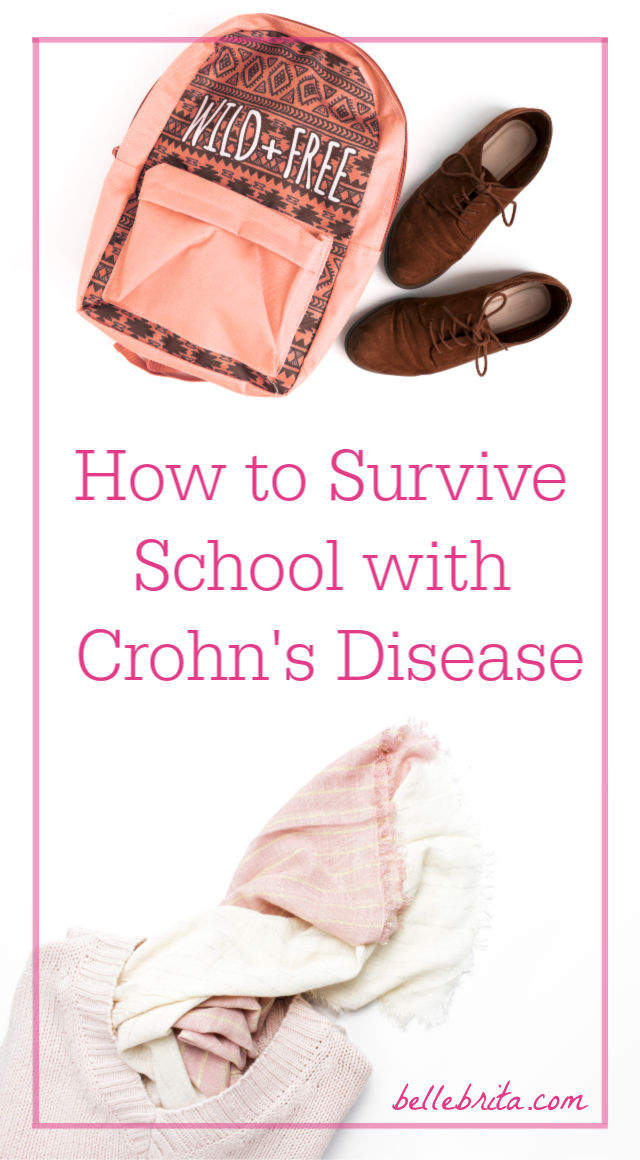I was diagnosed with Crohn’s Disease when I was only 8 years old, almost exactly 20 years ago. In some ways, my young age made it easier for me to manage school with Crohn’s Disease. Third graders (usually) haven’t yet learned how to bully their peers. In other ways, my early diagnosis made me grow up fast, and not exactly in a good way. Children shouldn’t be stuck in a position of self-advocacy for academic accommodations, but I often was.
If you or your child is going back to school after a Crohn’s Disease diagnosis, it’s not the end of the world. Yes, life will never be the same. Yes, you will face different academic challenges than your able-bodied peers. But with perseverance and pro-active communication, you can survive school with Crohn’s Disease.
To help me write this post, I asked my fellow Crohnies Nicole and Stewart for their advice. The three of us co-moderate the IBD community Crohn’s Sucks.
While I am sharing my experiences with Crohn’s Disease, much of this advice will also apply to children and teenagers with with Ulcerative Colitis.
Note: This is all general advice, based on firsthand experiences. Read your school’s handbook to find out the best people to inform about your child’s condition. Possible accommodations will vary according to the severity of the Crohn’s and your school’s policy. If necessary, you can request a 504 (Accommodation) Plan. The CCFA has a template to get you started.
Elementary School with Crohn’s Disease
This section is mainly for parents of children diagnosed with Crohn’s Disease. You are the best advocate for your child. That said, you also need to encourage your child to be assertive as necessary at school in regards to any Crohn’s issues.
- Schedule a meeting with your child’s teacher. As necessary, also meet with your child’s guidance counselor, school nurse, and school principal. Explain that your child has Crohn’s Disease and will need certain accommodations.
- Print off brochures for your child’s teacher(s) and other pertinent staff about Crohn’s Disease. While you should cover all the main points during the parent-teacher conference, you can’t expect the teacher to remember all the details. A brochure is a handy reference to keep in the classroom. You can use this guide from the CCFA.
- Ask your child’s pediatric gastroenterologist to write a medical note explaining your child’s condition. Have this note added to your child’s file at school. This will help with school absences.
- Teach your child the importance of asking for make-up assignments. Missing school for doctor’s appointments or illness is not an excuse to skip out on classwork or homework.

Middle School with Crohn’s Disease
I wasn’t self-conscious about my Crohn’s until I hit middle school. Then again, who doesn’t feel self-conscious about their body during middle school? This is when I discovered that my peers didn’t poop in public bathrooms. Me? I rarely have a choice about where I poop, especially when my stomach flip-flops in warning.
If your child was diagnosed in elementary school, transitioning to middle school with Crohn’s Disease is a minor challenge. A Crohn’s diagnosis in middle school, however, can be more difficult, particularly if your child misses a lot of school.
Advice for Parents
- Most middle school students change classes, which means your child has more teachers. If your child already has Crohn’s while starting middle school, you should be able to speak with their teachers at an Open House or Parents’ Night or Orientation. If the diagnosis comes during middle school, schedule a meeting with at least your child’s guidance counselor.
- Even if you are unable to speak with each teacher one-on-one, your child can still provide their teachers with a brochure about Crohn’s Disease.
- Be prepared to fight the administration. In my experiences, school absence policies become more important in middle school than they were in elementary school. Crohn’s patients miss a fair amount of school. That said, they shouldn’t necessarily need to be held back a year.
- Check in regularly with your child. Make sure that teachers aren’t giving your child any problems about bathroom visits, school absences, or any other Crohn’s issues.
Advice for Students in Middle School with Crohn’s Disease
- Find an adult at the school who will be your advocate. This might be your favorite teacher, your guidance counselor, the librarian, the vice-principal, or someone else. Foster a good relationship with that adult. Be friendly, polite, and honest with that adult. If other students or school staff give you problems about your Crohn’s Disease, ask this adult for help. Unfortunately, some teachers can bully students, so you will want at least one school employee to be on your side. This adult can also help you and your parents navigate any paperwork the school might require for your accommodations.
- It’s normal to feel embarrassed about having Crohn’s Disease. Depending on your friend circle and your comfort levels, find at least one friend to take in your confidence. School with Crohn’s Disease can be a lot easier with a good friend who understands what’s going on with your health.
- Keep a spare change of clothes in your locker, backpack, or in the nurse’s office. “Sharting” is a major Crohn’s symptom. Other times, you might not get to the bathroom in time. If other kids ask you why you changed your clothes, you don’t need to give them an honest answer. Either tell them to mind their own business, or tell a little white lie. “The sink exploded on me, so I was sopping wet. Luckily I always keep back-up clothes in my locker/backpack.” or “I’m doing an experiment on observational skills. I’m counting how many people noticed I changed my clothes!” or something else creative.
- Keep emergency bathroom supplies in your backpack or locker. Poo-Pourri actually works to prevent bathroom smells. You can also just use some air freshener or body spray. Put extra toilet paper in a baggie just in case a school stall is out. If your bottom is sore, pack some Vaseline or diaper ointment as well. Include hand sanitizer, wet wipes, plastic gloves (for handling soiled clothing), and freezer bags (for storing soiled clothing).
- Keep up with your schoolwork. Missing class for an illness or doctor’s appointment is not an excuse to fall behind on your assignments. Ask your teachers ASAP for any missed assignments. If you know you have a doctor’s appointment, ask for your assignments before you miss class. A school agenda or planner can help you keep track of your assignments. If a teacher doesn’t have your make-up work available when you ask, jot down a note in your planner that 1) you did ask and 2) when to ask again later. I had one teacher who tried to blame me for not doing my make-up work, even after I asked her repeatedly for it.
High School with Crohn’s Disease
Physically, getting through high school with Crohn’s Disease was the most difficult for me. Mentally and emotionally, by the time I was in high school, I could handle my Crohn’s just fine. However, just like with middle school, there is a difference between transitioning to high school with Crohn’s and having a Crohn’s diagnosis in high school.
Advice for Parents
- Schedule a meeting with your teenager’s guidance counselor. Just like in middle school, your teenager has multiple teachers, and you might not be able to meet with all of them.
- Now is the time to teach your teenager how to manage Crohn’s Disease on their own. Obviously your teenager still needs you for doctor’s appointments, prescription reminders, and help with the school administration. That said, high school is a chance to discover independence with Crohn’s Disease, a necessary skill for after graduation.
- Your teenager can do extracurricular activities at school with Crohn’s Disease. Just like the school might provide academic accommodations, they can provide accommodations for many sports, clubs, and other activities. After you’ve cleared the activity with the pediatric gastroenterologist, talk to the teacher sponsor or coach. Find out which accommodations are available.
Advice for Students in High School with Crohn’s Disease
- Learn to prioritize. High school classes are more difficult and demand more homework than middle school classes. If you play a sport or participate in a club, those activities also require more time. Transitioning to high school can be difficult for anyone, but it’s especially challenging with Crohn’s Disease. You might need to cut back on TV or video games or Reddit to meet your obligations and still get enough sleep.
- Call a friend for missed assignments. In elementary school and in middle school, getting makeup work from your teacher when you return is usually sufficient. In high school, however, you can easily fall behind in your homework if you let it pile up for several days.
- Listen to your body. On way too many occasions, I went back to school before my body was ready. I would wear myself out and then be sick for another two days. It is not easy to miss class in high school, especially if you’re taking Honors/AP classes. That said, your overall physical health is more important than Calculus, I promise.
- Do not take advantage of your Crohn’s. Did you not finish your homework because you were throwing up all night, or because you went out with your friends? Does your stomach actually hurt, or do you not want to take a test today? Accommodations should not be advantages.

Potential Accommodations for Students with Crohn’s Disease
In my 20+ years with Crohn’s Disease, I have been fairly lucky. I’ve only been hospitalized once. My Crohn’s is at its severest right now, and it’s still only “moderate.” I still needed special accommodations at school. I received blanket permission to use the restroom whenever I asked, even during a test. I progressed each year with my class, even when my school absences exceeded official policy. In high school, I had a second set of books to keep at home. Other accommodations might include:
- Permanent restroom pass
- Permission to use a faculty bathroom
- Homework extensions
- At-home tutor
- Permission to have snacks/drinks throughout the day
Additional Resources
Teen Guide: Dealing with Crohn’s & Colitis
Teens and Inflammatory Bowel Disease (IBD)
My unfortunate reality is that I’ve lived with Crohn’s Disease longer than many gastroenterologists have been practicing medicine. It’s a shitty disease (pun intended). If I can help any Crohn’s patient or parent of a Crohn’s patient, it will make my own struggle more worthwhile.
Feel free to ask me any questions. I’m an open book when it comes to my Crohnie life! If you’re uncomfortable leaving a comment below, you can contact me privately as well.


Great post. It must have been so hard being diagnosed so young. I was 19 and I struggled.
It definitely wasn’t easy. In some ways, having Crohn’s robbed me (and indirectly, my brothers) of a normal childhood. But overall, I’ve been very lucky with my Crohn’s. I’m on Remicade now, and that’s the strongest drug I’ve ever had to be on.
Both of my sons (and I) have an immune system disorder, so I could really relate to this post! You have some great ideas here, but I would add one more REALLY important reminder for parents: Get your child a 504 Plan or IEP! This is an accommodations plan, a written agreement with the school about exactly what accommodations they will provide for your child. Having this documentation in place is sooo important because without it, everything depends on which administrators/teachers you get and how compassionate they are. We fought many, many horrible battles with schools over the years. Here’s a blog post I wrote with all the details about 504s and IEPs:
http://livewithcfs.blogspot.com/2012/03/school-accommodations-for-kids-with-cfs.html
Great post! Glad I found you through the Painted Teacup Link-up.
Sue
Live with CFS
I definitely agree, which is why I noted the possibility of a 504 plan and linked to CCFA’s template for it. It’s not necessary for all children with Crohn’s Disease, though, since the severity varies wildly by patient.
Thanks for sharing you experiences on 504s and IEPs!
Oh, great – so sorry I missed that line somehow 🙂 Thanks
This is an absolutely great read. I, too have a chronic illness. I am going to share this post to the page I run, Positivity In Pain. I think a lot of people can definitely benefit from it! Keep on keeping on, girl!
I’m so glad you enjoyed this post! Living with a chronic illness isn’t easy, but it is doable with an open mind, some flexibility, and a good support system. Thank you for sharing!